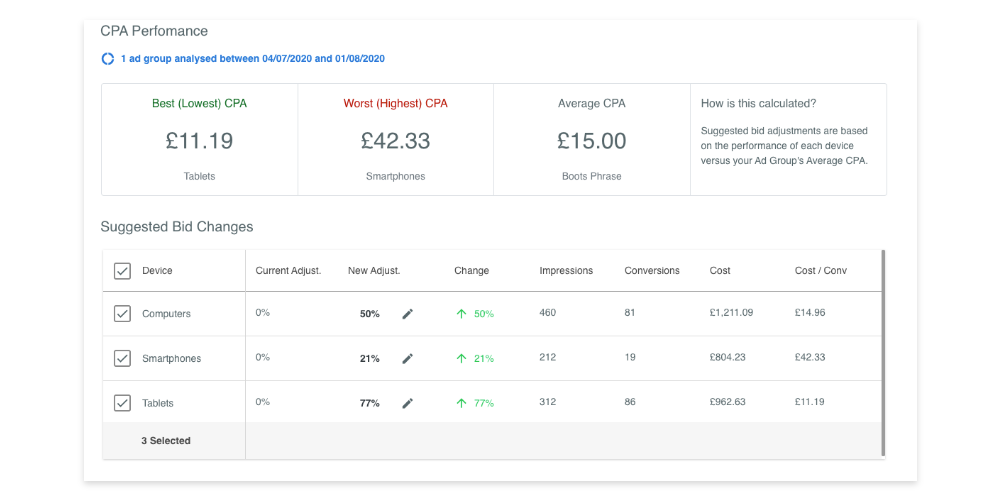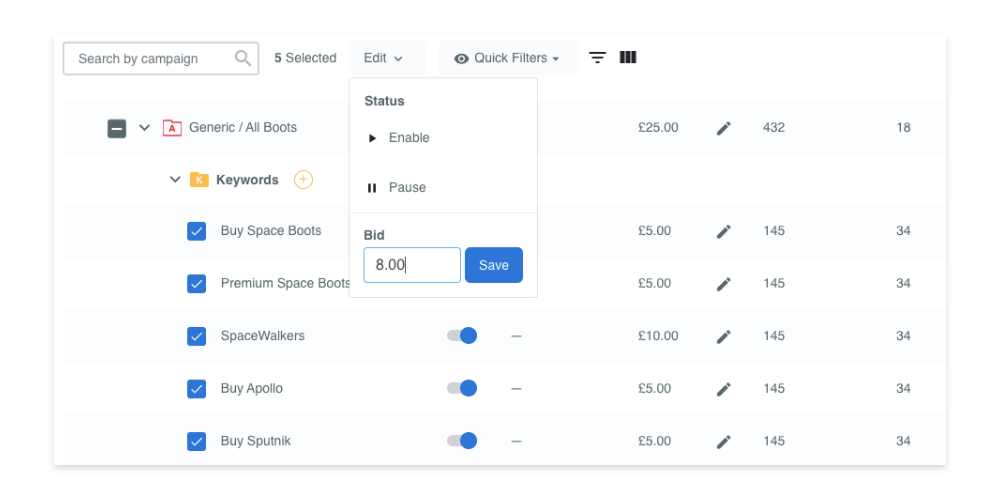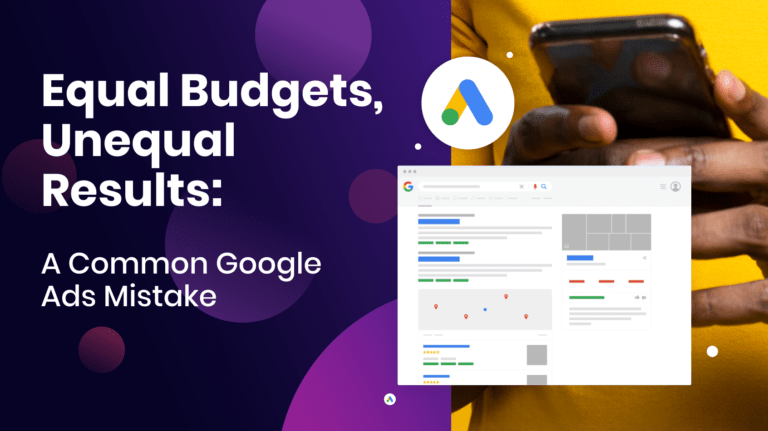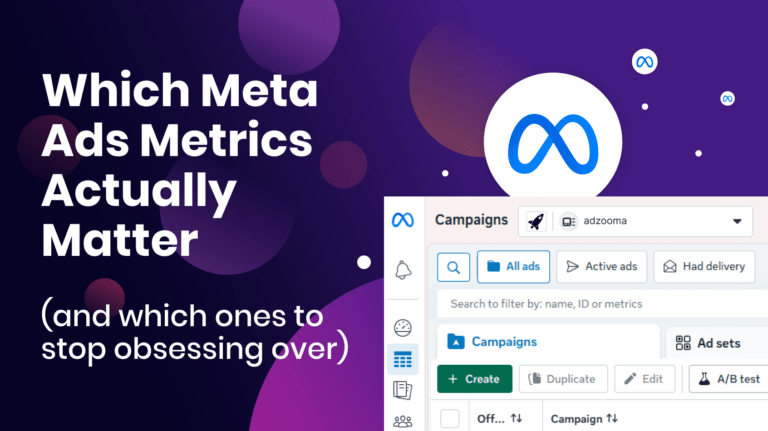If you want to increase your ROI from your PPC campaigns, having an effective keyword bid strategy is a fundamental part of achieving it.
Keyword bids are how you make sure that your allocated budget is spent on the right campaigns. It’s how you prioritise your strongest contenders and weed out your weakest performers.
And it’s much less daunting than you think. In this article, I’ll run through some of the keyword bid management options out there, going through their pros, cons and giving you advice and instructions to build your own.
What are keyword bids?
Okay, a little context and background first. Keyword bids are how much money you are willing to spend on a single click for that particular keyword.
Every time someone searches for one of your keywords, your business is entered into an auction to see which adverts are shown. Keyword bids are how far your little robot man is willing to raise the paddle for you. But don’t worry, keyword bids aren’t your overall budget.
It’s like giving a kid £20 and free reign of a sweet store. They could spend the entire budget on a single box of expensive artisan chocolate, but that means you’re putting all your money on a single gambit.
But, if you gave a kid £20 and told them not to spend more than £1 on a single item, they could come back with 3 bars mars, 8 Freddos, two-dozen lollipops, sour candy, Haribos, chocolate coins, skittles and more. Actually, I might be lying about the Freddos. It depends if the cost of them has risen past £1 yet or not.
Now before I get too snacky and off-topic, the moral here is that: setting a keyword bid allows you better control over your money and more effective use of your overall budget.

What is an effective keyword bidding strategy?
Online advertising will never be a fixed and stable cost. It’s a flexible, changing entity that requires attention, expertise and strategy to tame.
As we’ve run outlined earlier, keyword bids allow you to set a maximum cost you’re willing to pay for a particular click on a keyword. This makes sure that all your budget isn’t instantly spent on expensive clicks that might not convert for your business.
But it’s not just about avoiding expensive clicks or bidding on the cheapest options available.
An effective keyword bidding strategy is all about making sure your budget is spent on the keywords that deliver the most results at any given time. Which means that ultimately, it depends on the overall goals of your business.
- Want to get as many sales as possible? You’ll want to bid on keywords that are delivering you the most conversions.
- Want to bring cheaper leads into your business? You’ll want to bid on keywords that are delivering the best CPA.
- Want to increase brand awareness? You’ll want to bid on keywords that get the most impressions and are placed at the top of the page.
Make sure you know what your goal is first, then we can move on to the keyword bidding strategies you’ll be using.
Manual vs Smart bidding
If you’re managing your PPC using native platforms such as Google Ads or Microsoft Advertising, you’ll be faced with two main keyword bidding options to begin with: manual bidding or smart bidding.
- Manual bidding is where you set your keyword bids and budgets yourself. You’ll have complete control over each keyword bid, but that does mean you’re 100% responsible for its management.
- Smart bidding is an automated bidding system that uses machine learning to alter bids on your behalf.
You can also use third party platforms or management systems, but let’s look at the two native options first.

Manual bidding: a real-time waster
Update: Google has made another move to phase out manual bidding. By July no new Broad Match Modifier (BMM) keywords can be added and by the end of 2021 BMM will no longer be served in Google Ads.
Positives first: manual bidding gives you more control over your keyword bidding than every other strategy.
If you want to use manual bidding, you’ll have to set, and change, all the keyword bids by yourself. To do this inside Google Ads, you’ll have to:
- Click on the keyword that you want to change
- Select the ‘Max. CPC’ collum of the table
- Enter a new bid amount
- Click on save
Now, that doesn’t sound a lot. But if you’ve got hundreds of campaigns and thousands of keywords, that’s going to get very tiresome, very quick. Add to that that you’ll need to do this every time you alter a bid, then, yikes. That’s a lot of hours lost.
Then, once you’ve got everything set up, you’ll need to scan the data and results to measure which keywords you should be increasing your budgets for, and which are wasting your spend.
If you want to efficiently manage your keyword bids, using manual bidding on its own is a no go from us.
Smart bidding: not always smart results
Smart bidding uses machine learning to analyse your data, then automatically adjust your keyword bids to achieve a certain goal. The goals in question are:
- Maximise Conversions, which aims to get as many conversions as possible from your budget.
- Target ROAS, which aims to achieve your target return on ad spend (ROAS) from your budget.
- Target CPA, which aims to maintain your target cost-per-action (CPA) from your budget.
- Target impression share, which sets bids to show your ad at the top of the page as often as possible.
- Enhanced CPC, which uses your maximum cost-per-click (CPC) to maximise conversions.
So, if your goal is to get as many sales as possible, you can set up the maximise conversions smart budding strategy and just let it run. On paper, that’s the perfect way to efficiently manage your keyword bids. But in reality, this option isn’t perfect.
Smart bidding uses historical and campaign data to set your bids. If you don’t have a lot of data, or if you launch new campaigns, you’re not going to get the best results. What’s more, the data they use isn’t related to your target audience. You get no control of visibility on what data is being used to make this decision, meaning that you can never really optimise the results you’re getting.

If you’re looking for a quick, ‘set and forget’ option, then you’ll be hard-pressed to do better than Smart bidding. However, if you want better results and a truly efficient way to manage your keyword bids, you’re going to want to use a different AI solution…
Maximising efficiency with AI
The best way to manage your keyword bids more effectively is through AI. And no, this doesn’t mean smart bidding.
The right combination is to use a manual bidding process to control your bids while using AI to automate the changes and how you track and monitor your results. This will give you the best possible results while saving you time that you can use to grow.
To demonstrate the power of AI, we’ll take examples from Adzooma, as it’s got all the features you need under one roof while being completely free to use. Of course, you’ll be free to use another platform or software to implement these strategies… but it will come at a monthly cost.
1. Do the bulk of the lifting with automated rules
Automated rules are the real stars of an efficient keyword bidding strategy.
If you’re not familar with them, they’re a way of setting actions that happen when a certain event happens. For example, you could set an automated rule to notify you (action) when conversions for a campaign hit 0 (event).
For keyword bids, automated rules are time-saving miracles. They allow you to apply your own strategy and conditions to each campaign as you see fit.
Let’s say that you want to maximise conversions for your campaigns. One rule you can set up is the High Volume, Low Conversion rule. This will notify you of campaigns that are getting a lot of clicks, but not a lot of conversions.
When you get this alert, you’ll be able to take a deeper look at the keywords, finding out which ones are dragging performance down or creating a new campaign for the high performers.

With automated rules, you could also:
- Set a rule where if a campaign has a conversion rate above your target, you can automatically increase the budget by 10%.
- Or you could pause keywords that have a poor CTR, saving your budget for better-performing ones.
- And so on. The power lies with you.
Discover how to create custom rules here.
With Adzooma, you can set the frequency to every 30 minutes. That means that every single half an hour, Adzooma will check your campaigns on your behalf and ensure that your keyword bids are optimised 24/7.
Even better news, you can save even more time by selecting a rule from our list of pre-made templates, all chosen by PPC experts.

You can set automated rules inside the Google or Microsoft platforms. But you won’t get any premade templates, and the rules will only fire once a day at a preset time. The best features are exclusive to Adzooma.
2. Have your account analysed for opportunities to optimise
One of the key factors to meaning keyword bids and being an excellent PPC manager is recognising and taking opportunities to optimise your campaigns.
At Adzooma, we help automate this process with personalised recommendations for your campaigns. We call them Opportunities.
Some of our Opportunities include highlighting keywords that you should increase keyword bids for, or bid adjustments you should make based on the device used or the gender/ age of your audience.
If you’re happy with the Opportunities we show, you can apply them to your account in a click, saving you from manually having to go in and make bid adjustments to your campaigns.

PPC should never work in isolation. Remember the bigger picture and make sure that all your components are working together like a well-oiled machine. That means not forgetting about factors such as Quality Score, which can have a big impact on both your rankings and your CPC.
As we uncovered in recent research with Cambridge University, landing page quality can have a big impact on your conversions. So, make sure your focus isn’t too narrow.
But don’t worry, we’ve got Opportunities for that too at Adzooma.
3. Bulk apply changes in one go
Like we mentioned earlier, manually going into each campaign to change and set keyword budgets is a real time-waster. As well as being able to set up automated changes, you need a system that allows you to view and make bulk edits in one go.
A system that we’ve got with Adzooma Management.
This is a single screen you can view all your campaigns at once, with customizable data to show the metrics that matter most to you. If you want to make any changes, just navigate to the keywords or ad groups you want to change. Then, click the pencil icon to write a new bid, or select multiple options and click the edit button at the top to apply mass changes.

Using Adzooma Management to change all these keyword bids to £8.00
Adzooma Management will also allow you to add new keywords (or negative keywords) without switching back into your Google or Microsoft accounts. That’s time saved which you can use to focus on your wider strategy.
Strategise, automate, win
Fundamentally, managing your keyword bids comes from three key steps.
- Setting your goals and building your initial strategy.
- Applying automated rules to run this on your behalf.
- Monitor your results and see your successes come in.
Seems pretty simple, right?
If you’re still hungry for more, perhaps these articles will sate your appetite.
- PPC Keyword Research: How To Do It The Smart Way
- 3 Powerful PPC Automation Rules To Start 2021 Right
- Why Content Strategy Is Crucial to PPC Success: Cambridge Uni x Adzooma
- How To Create a Long-Term PPC Strategy You Can Stick To
- Applying Behavioural Economics To Businesses & PPC: An Analysis
If you’re done researching and are ready to take your PPC campaign to the next level, create your free Adzooma account today.




